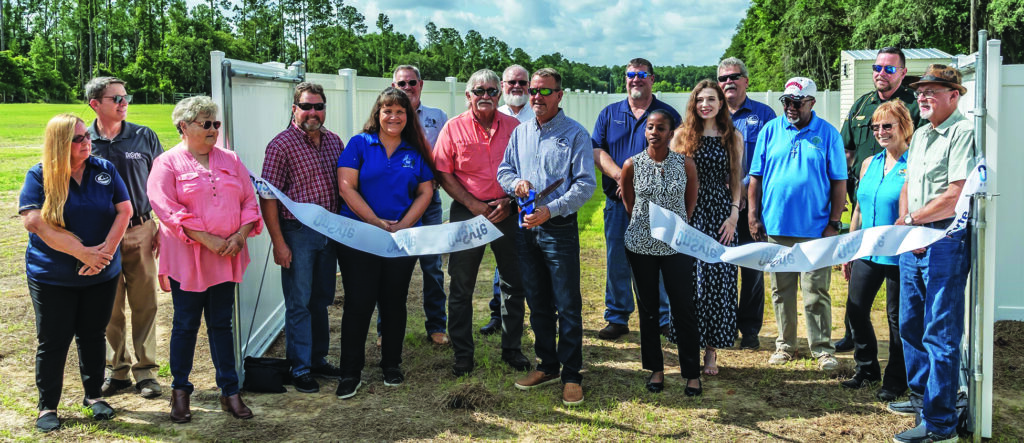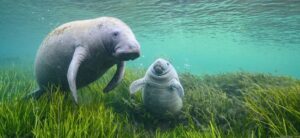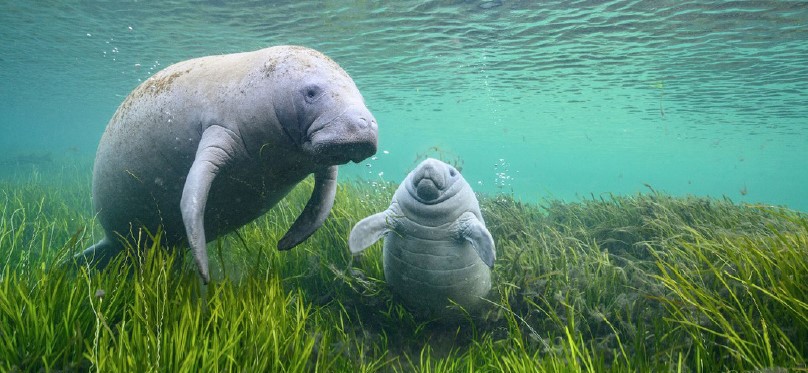By Staff Reports

Dignitaries, elected officials, and local stakeholders alike recently gathered for a ribbon cutting celebrating a new Distributed Wastewater Treatment (DWT) installation. While the innovative technology is significant for its positive environmental impact, an even greater result may be how it transforms the lives of our veterans.
On May 17, OnSyte Performance unveiled its largest DWT deployment to date at Otter Springs Park and Campgrounds. The single unit replaced 27 aged septic tanks and virtually eliminates the threat of excess nitrates being introduced to local waters, including the Floridian Aquifer and nearby Suwannee River.
The ribbon cutting signifies new development. ForVets, Inc., a nonprofit organization supporting veterans transitioning back to civilian life, has big plans for the area; plans that have been on hold due to wastewater issues in the Nature Coast area of Gilchrist, Dixie, and Levy counties.
“Our new transitional program will be called Camp Valor,” explained Robert Wells, president of ForVets, Inc., located in Trenton, Florida. “We have significant plans for this location, but they have been delayed for years due to sewage treatment limitations. We’re now ready to start building so we can help more veterans.”
Wells said their first construction project will be a voc-tech school teaching the repair and maintenance of recreational vehicles. That project will be followed by a 100-bed rehabilitation facility and then an event center.
None of this would have been possible without OnSyte Performance’s modern wastewater treatment technology coupled with the partnership of the Suwannee River Water Management District, the Florida Department of Environmental Protection (FDEP), the Nature Coast Regional Water Authority, and Gilchrist County.
OnSyte’s proprietary technology, Distributed Wastewater Treatment (DWT), provides a much higher level of sewage treatment than septic tanks. For rural areas that cannot afford a municipal wastewater collection and treatment system, DWT is an alternative that is affordable and effective.
“The Otter Springs unit is one of our largest installations in Florida,” said Jeff Littlejohn, the Vice President of Regulatory Affairs for OnSyte Performance. “We have units for individual homes that are about the size of a normal septic tank. We also have larger systems for schools, churches, assisted living facilities, and similar-sized development. Our technology works in areas where municipal wastewater systems are not feasible. DWT units protect the environment and can promote economic development.”
An important technological aspect of OnSyte’s DWT systems is that individual units are remotely monitored by trained personnel. Should an adjustment or repair be required, a technician is notified immediately. In such a proactive manner, DWT systems operate like a municipal sewer system, with ongoing monitoring and maintenance.
“The time has come to integrate new, efficient systems that address potential nitrate contamination of our water resources here in North Florida,” said Hugh Thomas, Executive Director of the Suwannee River Water Management District. “We are working closely with the Nature Coast Regional Water Authority, Gilchrist County, the legislature, and FDEP to fund more projects like the one at Otter Springs.”
Nitrate pollution is a significant problem in many parts of Florida. Large numbers of septic tanks in close proximity often leach nitrates into the environment. The nitrates cause excessive algal blooms that choke out aquatic plants and harm marine life. Local waters can even become unsafe for human use. As a result, real estate values and tourism decline.
DWT units process wastewater similarly to municipal sewage plants. They utilize a three-chambered, suspended-growth activated sludge sequencing batch reactor where the biological nitrogen is removed. The process creates effluent that can be safely released into the environment. Multiple university studies have proven the method effective and efficient.
“This project was necessary to protect the springs and allow for development,” said Gilchrist County Administrator, Bobby Crosby. “We had to eliminate the old conventional septic system. Along the way we learned about the OnSyte technology and found it was an affordable alternative for us. It’s just wonderful to be able to protect our natural resources and provide these great facilities for our military veterans who have done so much for us.”
Debbie Destin is Chief Operating Officer of the Otter Springs Park and Campground. She has been waiting for the Camp Valor project to begin for several years, pending a solution to the nitrate pollution problem. “We have had to wait to build the new buildings until we solved the septic tank problem. The new OnSyte treatment system is going to benefit our park and our veterans.”●










